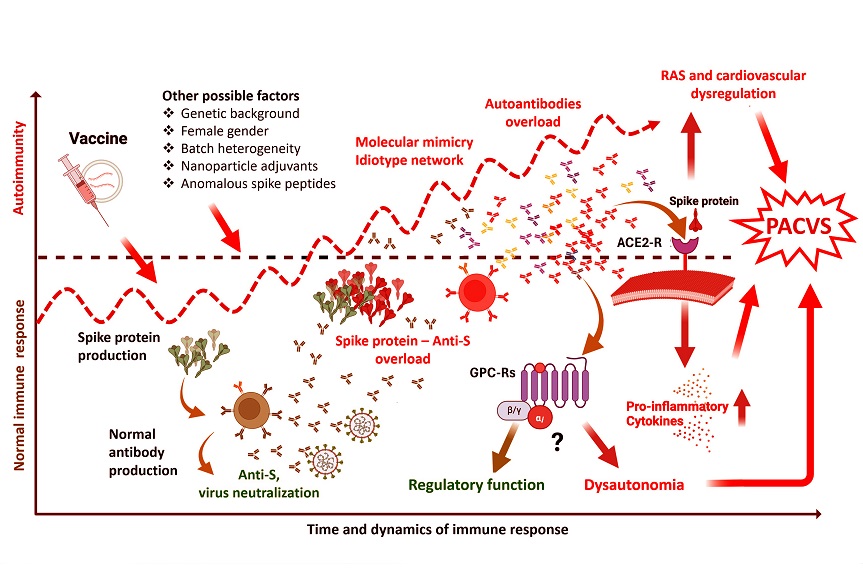High Prevalence of Autoimmune Issues Found in Those with Post-Acute COVID Vaccination Syndrome
Nikhil Prasad Fact checked by:Thailand Medical News Team Dec 16, 2024 3 months, 4 weeks, 8 hours, 22 minutes ago
Medical-News: The COVID-19 pandemic brought an unprecedented global health challenge, necessitating the rapid development and deployment of vaccines. However, many individuals have experienced unexpected adverse effects. Among these are cases resembling post-acute COVID-19 syndrome (PACS), but occurring in vaccinated individuals. This emerging condition, termed post-acute COVID vaccination syndrome (PACVS), is the focus of a recent detailed study exploring its immunological underpinnings.
 Graphical Abstract - High Prevalence of Autoimmune Issues Found in Those with Post-Acute COVID Vaccination Syndrome
Graphical Abstract - High Prevalence of Autoimmune Issues Found in Those with Post-Acute COVID Vaccination Syndrome
Conducted by researchers from the IMBIO Medical Institute in Milan, Federico II University in Naples, and the University of Verona, this study that is covered in this
Medical News report, investigates the potential autoimmune mechanisms underlying PACVS. It identifies autoantibodies as key players and suggests their utility as diagnostic biomarkers, providing insights that may guide future treatments and research.
Exploring Post-Vaccination Symptoms
PACVS encompasses a wide array of symptoms that overlap significantly with PACS, including fatigue, neurological disturbances, cardiovascular irregularities, and dermatological manifestations. The study examined 17 individuals who had no prior history of SARS-CoV-2 infection but experienced persistent symptoms following COVID-19 vaccination. These symptoms endured for a median duration of 20 months, highlighting the chronic nature of this condition.
The most frequently reported symptoms were:
-Chronic fatigue and asthenia (94% of participants)
-Cognitive impairments such as memory loss and mental fog (88%)
-Neuralgia or paresthesia (82%)
-Cardiovascular issues like tachycardia (76%)
-Dermatological symptoms, including bruising and rashes (29%)
Interestingly, a significant majority of the cases occurred in women, consistent with the gender distribution observed in many autoimmune disorders.
Investigating Autoimmune Mechanisms
The core finding of the study revolves around the identification of specific autoantibodies linked to PACVS. Autoantibodies are immune proteins that mistakenly target the body’s own tissues, and their presence offers clues about the condition’s underlying mechanisms. The following key autoantibodies were identified:
-ACE2 Autoantibodies
ACE2, the receptor for the SARS-CoV-2 spike protein, plays a critical role in regulating vascular and inflammatory processes. Elevated levels of ACE2 autoantibodies were strongly associated with dermatological symptoms, including bruising, rashes, and skin edema. Additionally, these antibodies were linked to hypertension and headaches, suggesting their involvement in vascular dysfunction.
Researchers hypothesize that these
autoantibodies may mimic the effects of the spike protein, leading to dysregulated immune responses and inflammation.
-MAS1 and STAB1 Autoantibodies
MAS1, a receptor associated with angiotensin-(1-7), and STAB1, a scavenger receptor implicated in chronic inflammation, were also elevated in participants. MAS1 autoantibodies correlated with widespread burning sensations, while STAB1 autoantibodies were linked to skin rashes and edema.
-ATR1 and PAR1 Autoantibodies
Autoantibodies targeting ATR1 and PAR1, both involved in vascular function, showed distinct associations. ATR1 autoantibodies were positively correlated with lymphadenopathy (swollen lymph nodes) and tonsillitis, whereas PAR1 autoantibodies seemed protective against these symptoms.
-ADRA2A Autoantibodies
ADRA2A autoantibodies were found to have a potential protective role against cognitive symptoms such as memory loss and mental fog. Participants with lower levels of these antibodies were more likely to report neurological issues.
Understanding the Broader Implications
The presence of these autoantibodies suggests that PACVS may stem from a complex interplay of immune responses triggered by vaccination. The spike protein’s role is central, as it may act as a molecular mimic, inducing autoantibodies that cross-react with host proteins. Additionally, the study found a positive correlation between ACE2 autoantibodies and anti-spike antibodies, supporting the hypothesis of an anti-idiotype mechanism.
This mechanism, where antibodies against the spike protein inadvertently generate autoantibodies targeting host proteins, offers a plausible explanation for PACVS. Factors such as genetic predisposition, vaccine composition, and individual immune responses likely contribute to this phenomenon.
Potential Diagnostic and Therapeutic Approaches
A major challenge in managing PACVS lies in its diagnostic complexity. Patients often undergo extensive evaluations without conclusive findings, prolonging their suffering. The study’s findings suggest that testing for specific autoantibodies, especially ACE2, MAS1, and STAB1, could provide valuable diagnostic insights.
Therapeutically, these findings pave the way for targeted interventions.
Treatments that modulate autoantibody activity or immune responses could offer relief for PACVS patients. Monitoring autoantibody levels may also help track disease progression and treatment efficacy.
Study Limitations and Future Directions
While the study provides groundbreaking insights, its limitations must be acknowledged. The sample size of 17 participants is relatively small, necessitating larger studies to validate these findings. Additionally, the absence of a control group limits the generalizability of the results.
Future research should focus on:
-Expanding sample sizes to strengthen statistical power.
-Investigating the functional effects of identified autoantibodies.
-Exploring genetic and environmental factors contributing to PACVS susceptibility.
-Developing standardized diagnostic panels and treatment protocols.
Conclusions: Illuminating a Path Forward
PACVS represents a novel and complex challenge in the realm of vaccine-related adverse effects. The study’s identification of specific autoantibodies linked to the condition marks a significant step toward understanding its pathophysiology.
The findings highlight the importance of ACE2 autoantibodies as both a diagnostic marker and a potential therapeutic target. By shedding light on the immune dysregulation underlying PACVS, the research opens avenues for personalized medicine approaches, offering hope for affected individuals.
In conclusion, PACVS underscores the need for ongoing vigilance in monitoring vaccine-related effects and advancing our understanding of immune responses. As research progresses, it is imperative to balance the immense benefits of vaccination with a nuanced approach to addressing its rare but significant complications.
The study findings were published in the peer-reviewed journal: Biomedicines.
https://www.mdpi.com/2227-9059/12/12/2852
For the latest Vaccine News, keep on logging to Thailand
Medical News.
Read Also:
https://www.thailandmedical.news/news/german-scientists-call-for-recognition-of-post-acute-covid-19-vaccination-syndrome-pacvs-as-a-medical-condition
https://www.thailandmedical.news/news/covid-19-infection-and-vaccination-causes-small-fiber-neuropathy
https://www.thailandmedical.news/articles/vaccine-news
